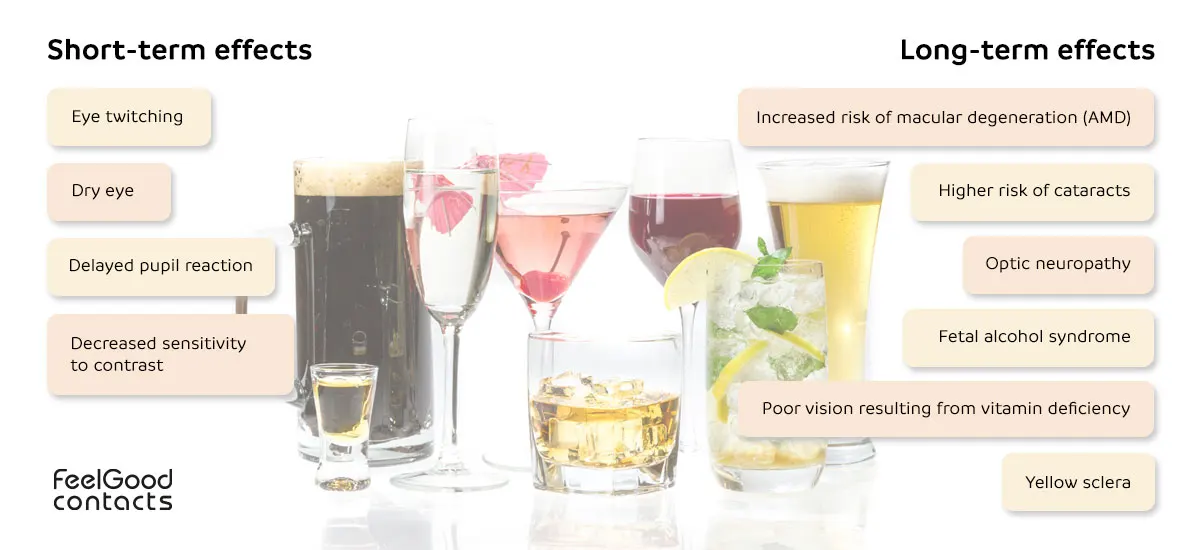While many of us enjoy a good drink, anyone who's had too much to drink knows that alcohol can cause distorted vision, blurred vision and double vision. These may be temporary effects; however, heavy drinking can cause long term vision effects as well as short term effects on your overall health and eye health.
Short-term vision effects
The consumption of alcohol in large quantities can cause the following short-term vision effects:
- Eye twitching-drinking an excessive amount of alcohol can cause your eyelid to twitch. This is also known as myokymia
- Dry eye - alcohol is a diuretic which means that it increases the amount of water and salt that passes through our bodies as urine. This causes dehydration which can lead to dry eyes as there aren't enough tears to lubricate the eye
- Delayed pupil reaction - binge drinking can cause the constriction and dilation of the iris to slow down. Drink driving is dangerous partly because drivers who have had too much alcohol can't adapt quickly to oncoming headlights
- Decreased sensitivity to contrast - alcohol also affects our ability to make clear distinctions between light and dark which also hinders the ability to drive
While many short-term effects of alcohol will go away on their own; long-term effects are more serious. Short-term vision effects can be more prominent if a vast amount of alcohol is consumed regularly.

Long-term vision effects
The long-term effects of drinking alcohol can have an even more severe impact on our vision. Long term effects include:
- Increased risk of age-related macular degeneration (AMD) - excessive alcohol intake has been identified by The American Optometric Association as a risk factor for AMD
- Higher risk of cataracts - research suggests alcohol abuse can lead to the formation of cataracts
- Optic neuropathy - this condition causes painless loss of vision and has been linked to excessive alcohol intake. This is also known as toxic amblyopia or tobacco-alcohol amblyopia
- Fetal alcohol syndrome - the consumption of alcohol can affect babies in the womb causing an underdeveloped optic nerve which can lead to a range of vision problems, as well as drooping eyelids and poor eye coordination
- Poor vision resulting from vitamin deficiency - too much alcohol consumption can affect the liver's ability to absorb vitamins which are needed for eye health. Vitamin B1 deficiency can cause the eye muscles to become weak, while vitamin A deficiency can lead to night blindness, dry eye, corneal perforation and retinal damage
- Yellow sclera - years of heavy drinking can cause the white part of the eye (the sclera) to turn yellow. This is a sign of liver disease
If you suspect that you are suffering from any of the long-term effects associated with alcohol, we recommend booking an appointment with your eye care professional immediately. Any specific questions will need to be addressed with your medical professional and eye care practitioner.
While drinking alcohol can be enjoyable and a fun social activity, moderation is key and keeping an eye on how much you drink will lower health risks from alcohol. According to UK guidelines, adults should not consume more than 14 units of alcohol a week, and these should be spread out evenly.
Lowering your alcohol intake will improve your circulation, which can, in turn, provide more oxygen and nutrients to your eye and help to prevent eye diseases such as age-related macular degeneration and glaucoma.
Quick links:
Is smoking bad for your eyesight?
Does drinking coffee damage your vision?
A guide to glaucoma
Disclaimer: The advice in this article is for informational purposes only and does not replace medical care or an in-person check-up. Please check with an eyecare professional before purchasing any products or remedies. For information on our article review process, please refer to our Editorial Policy.

 Offers
Offers Account
Account
 Favorite
Favorite
 Basket
Basket

 OFFERS
OFFERS

















